A couple of weeks ago Christine Emba wrote a piece for the New York Times about the grim state of young men in her social circle these days:
They struggled to relate to women. They didn’t have enough friends. They lacked long-term goals. Some guys — including ones I once knew — just quietly disappeared, subsumed into video games and porn or sucked into the alt-right and the web of misogynistic communities known as the “manosphere.”
....Women are surging ahead in school and in the workplace....Men now receive about 74 bachelor’s degrees for every 100 awarded to women....In 2020, nearly half of women reported in a TD Ameritrade survey that they out-earn or make the same amount as their husbands or partners.
This essay is part of a common genre nowadays—there's probably a whole shelf of books on the subject—and it happened to be the third or fourth I had read in a single day. That's just coincidence, but something about it got me curious: just how many of these loser men do we have? And is it increasing?
In the conventional narrative, these men are:
- Young
- Have a high school education or less
- Have a dead end job
- Are single
- Live alone or in their parents' basement
There's no way of knowing how many of these young men there are. That's partly because the definition is necessarily vague, and partly because the numbers don't exist. I didn't even bother trying to quantify it. Instead I went down a bit of a rabbit hole, collecting data related to all this stuff just to see what overall impression it left. We can start with the best known statistic:
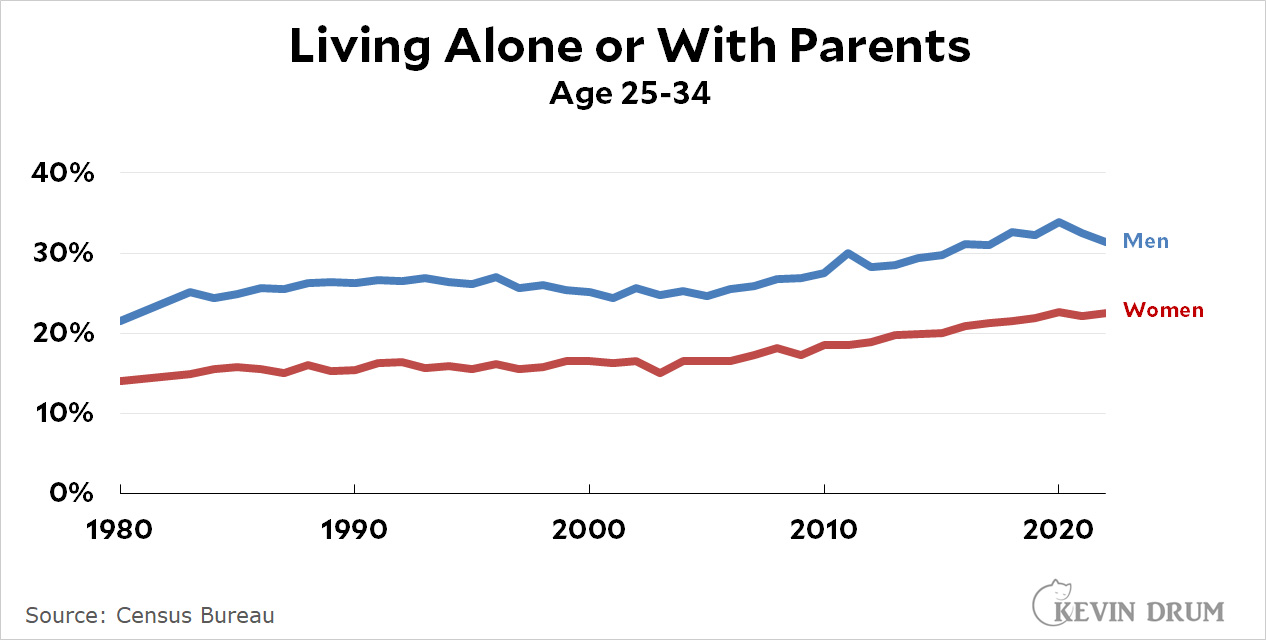 There's no question that young men live alone or with their parents more than they used to. At the same time, this number has increased just as much for young women. There's nothing unique to young men here.
There's no question that young men live alone or with their parents more than they used to. At the same time, this number has increased just as much for young women. There's nothing unique to young men here.
Next up is jobs. There are fewer young men working than in the past:
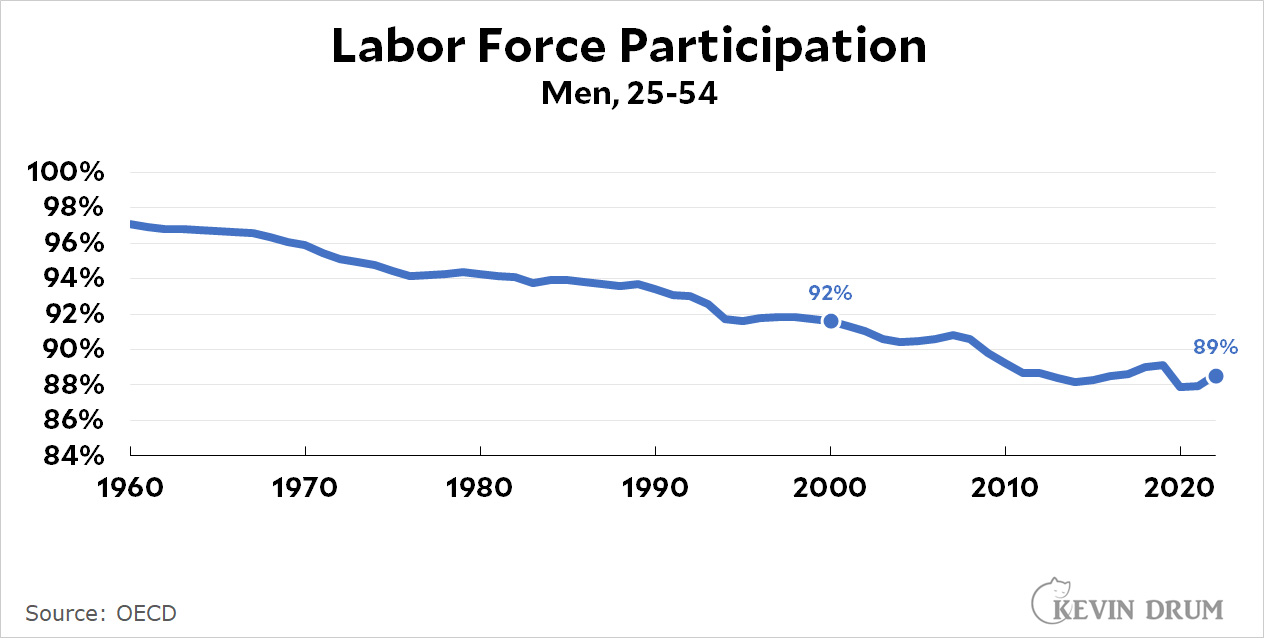 Note, however, that this is true of all age groups and it's nothing new. Labor force participation has been steadily declining for more than 60 years. The 3% drop since 2000 is just the continuation of a trend, not something new about modern manhood. Plus there's this:
Note, however, that this is true of all age groups and it's nothing new. Labor force participation has been steadily declining for more than 60 years. The 3% drop since 2000 is just the continuation of a trend, not something new about modern manhood. Plus there's this:
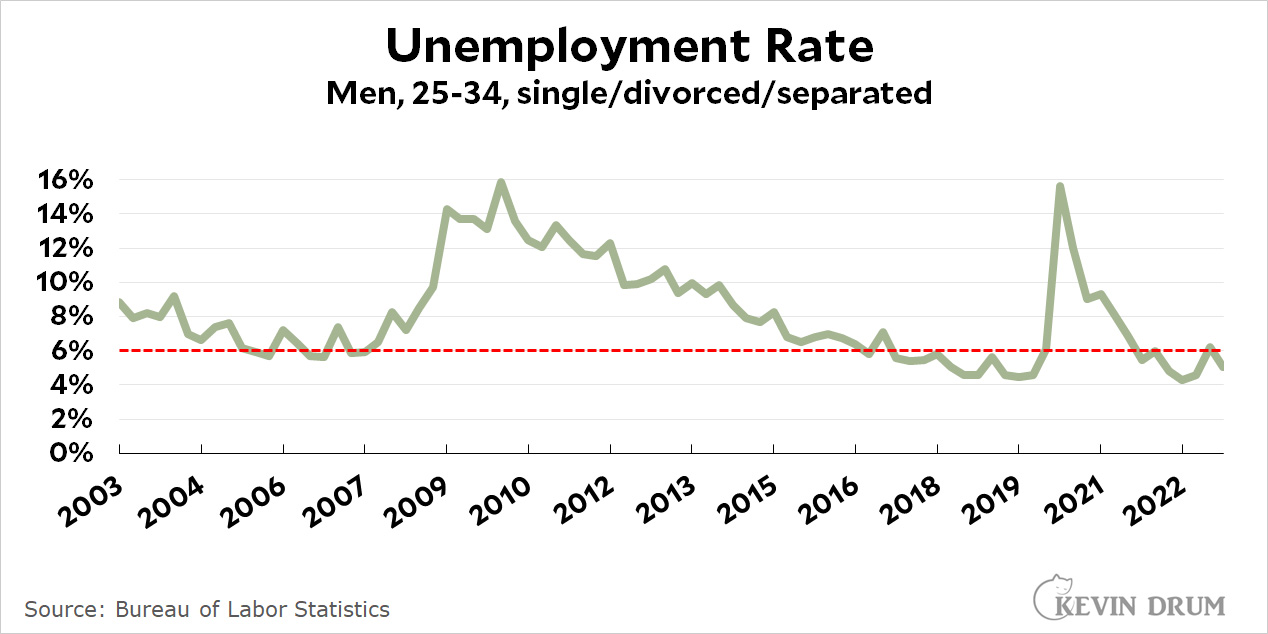 This is the unemployment rate specifically for single young men, and it's the same as it's ever been. There's also this:
This is the unemployment rate specifically for single young men, and it's the same as it's ever been. There's also this:
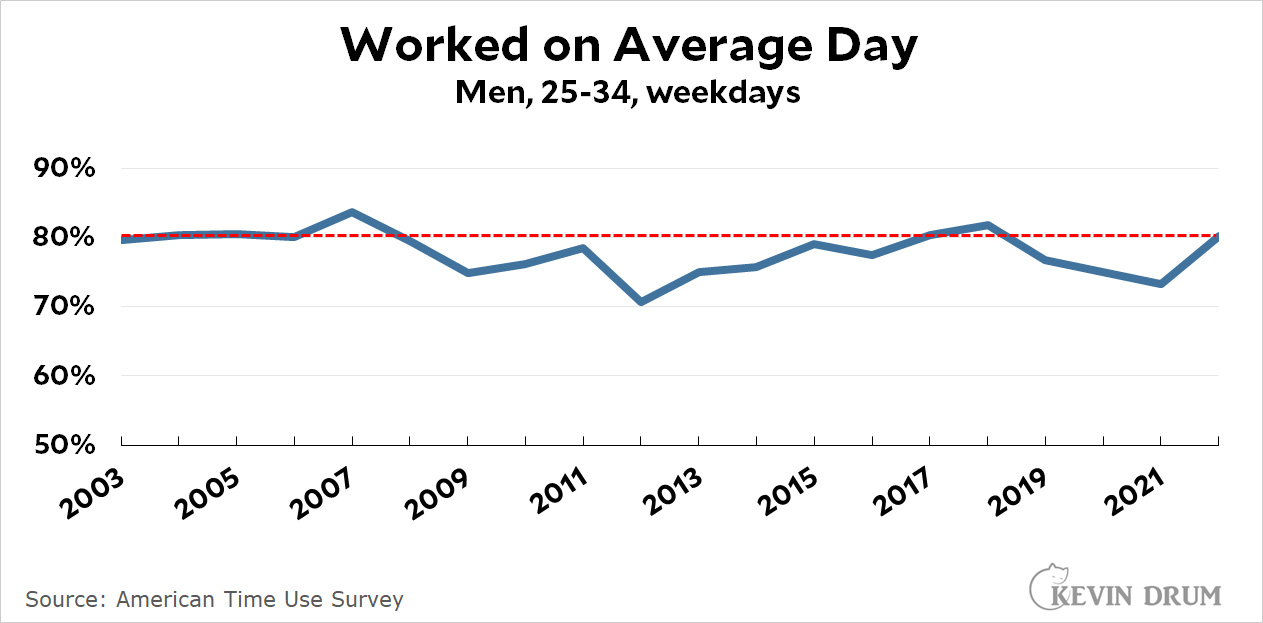 The decline in work doesn't show up at all in time use surveys. And young, low-income, high school educated men are earning as much as ever:
The decline in work doesn't show up at all in time use surveys. And young, low-income, high school educated men are earning as much as ever:
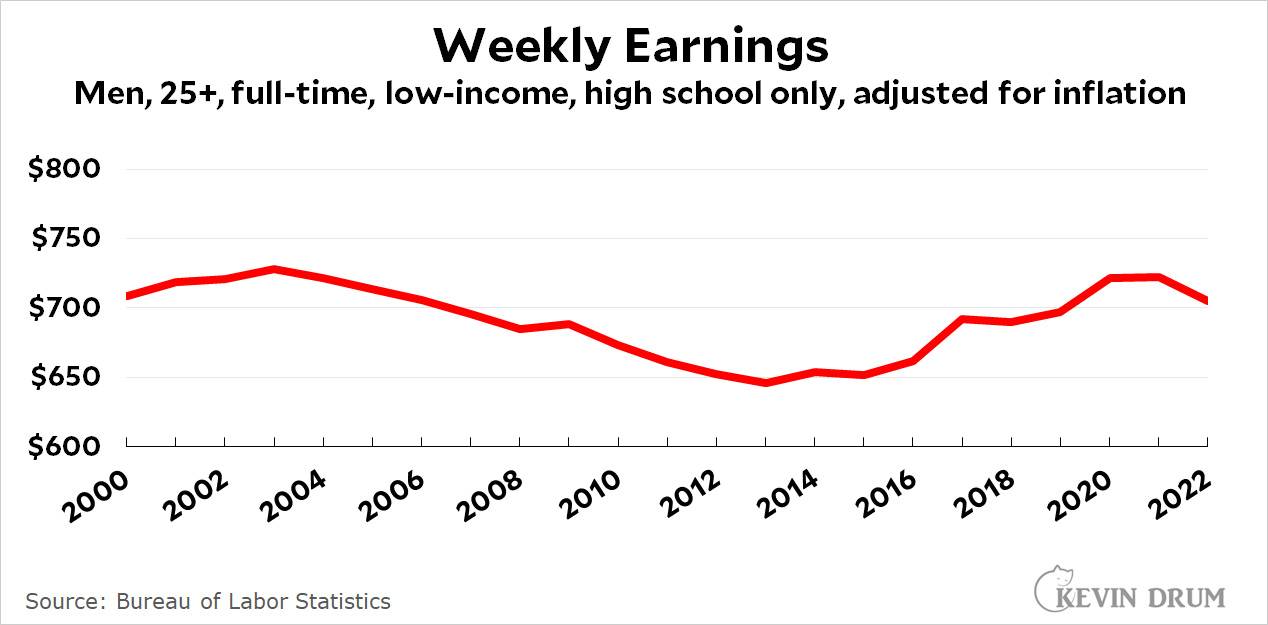 This is for full-time workers, so maybe it's because fewer young men are working full time? No:
This is for full-time workers, so maybe it's because fewer young men are working full time? No:
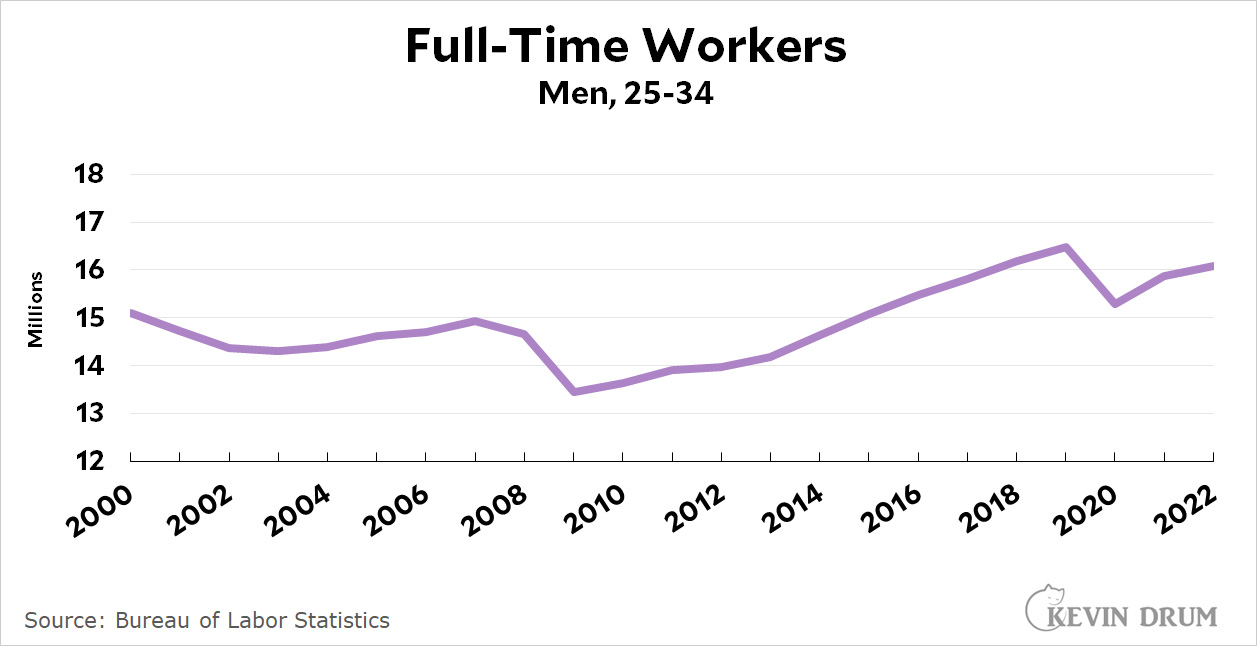 More young men are working full time. Now let's change gears. How about that business of college attendance declining? It turns out it's not true in any practical sense:
More young men are working full time. Now let's change gears. How about that business of college attendance declining? It turns out it's not true in any practical sense:
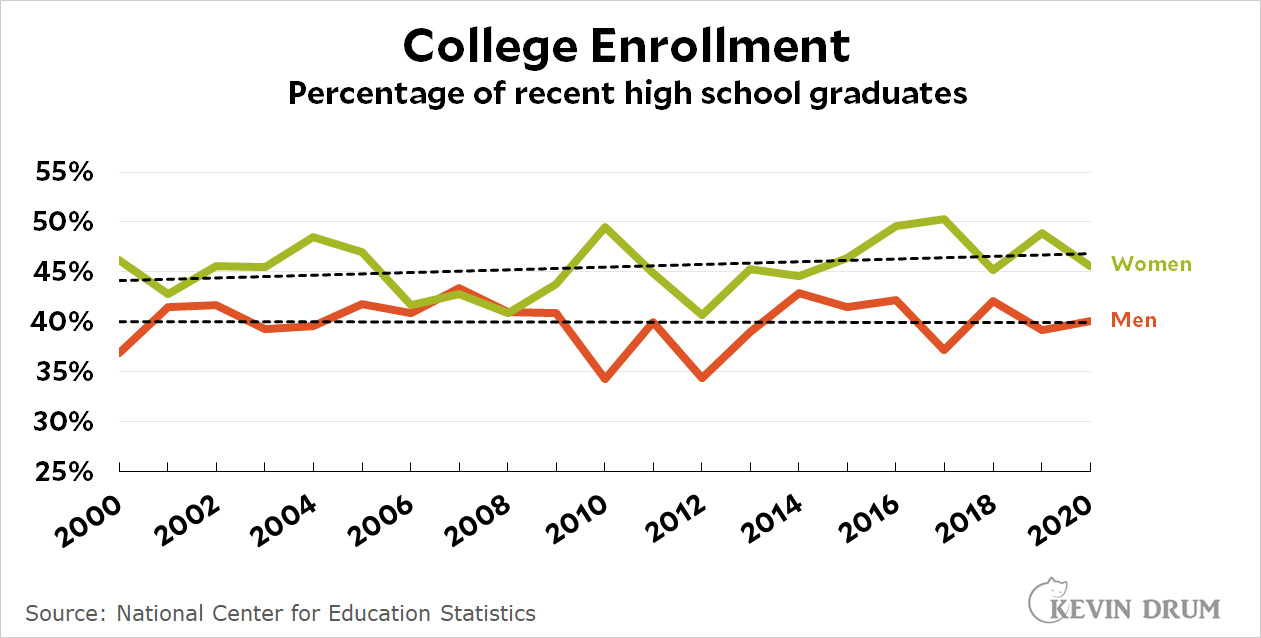
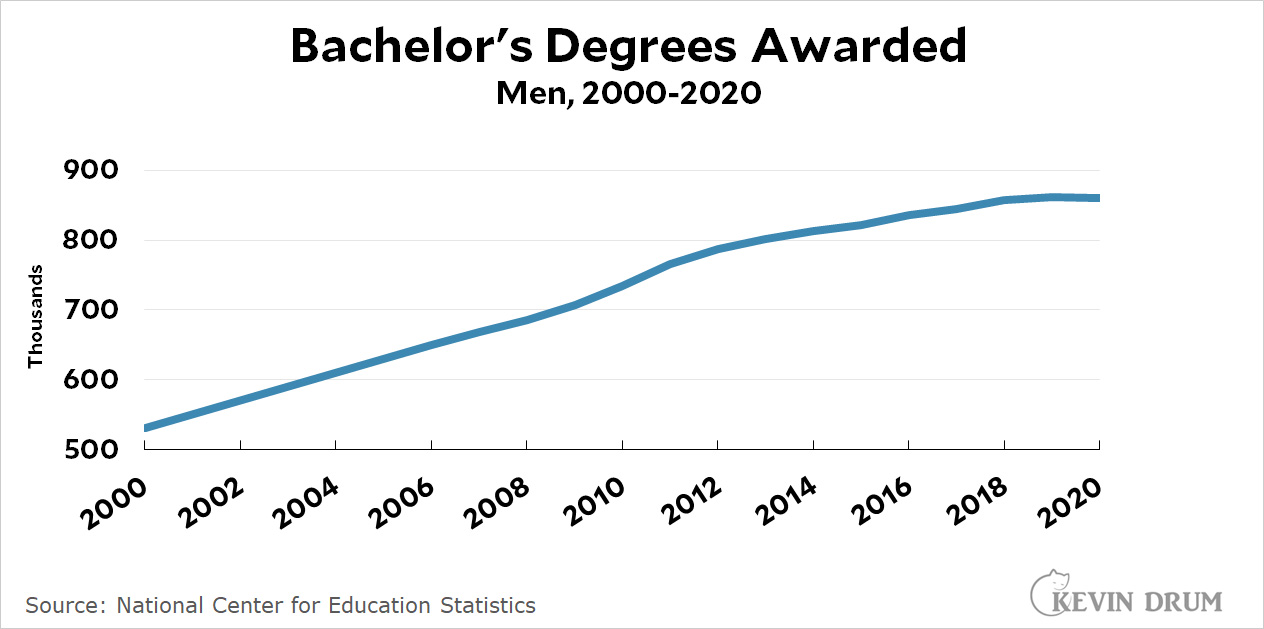 Enrollment of men is flat and the number who finish up and get a degree is way up. It's true that women outnumber men at universities these days, but that's not because there are fewer men. It's because there's been a modest increase in the number of women.
Enrollment of men is flat and the number who finish up and get a degree is way up. It's true that women outnumber men at universities these days, but that's not because there are fewer men. It's because there's been a modest increase in the number of women.
How about friends? Are young men hanging out in their basements and not socializing?
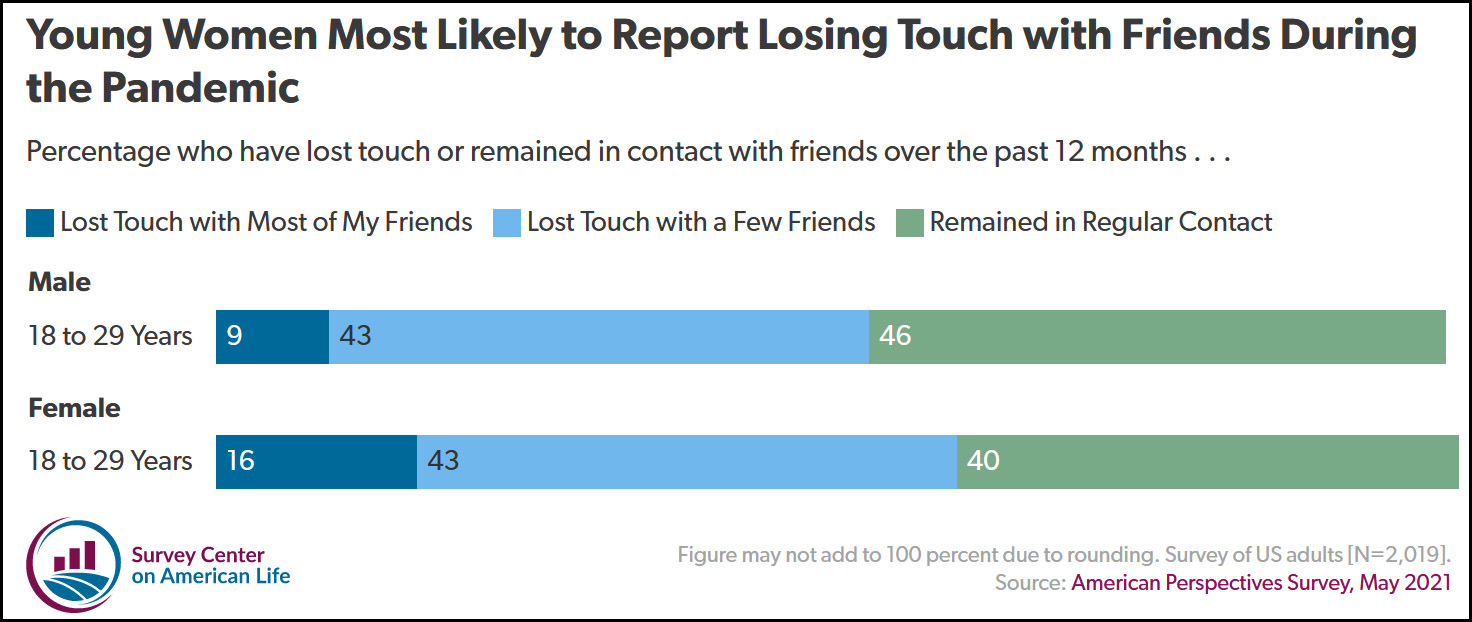
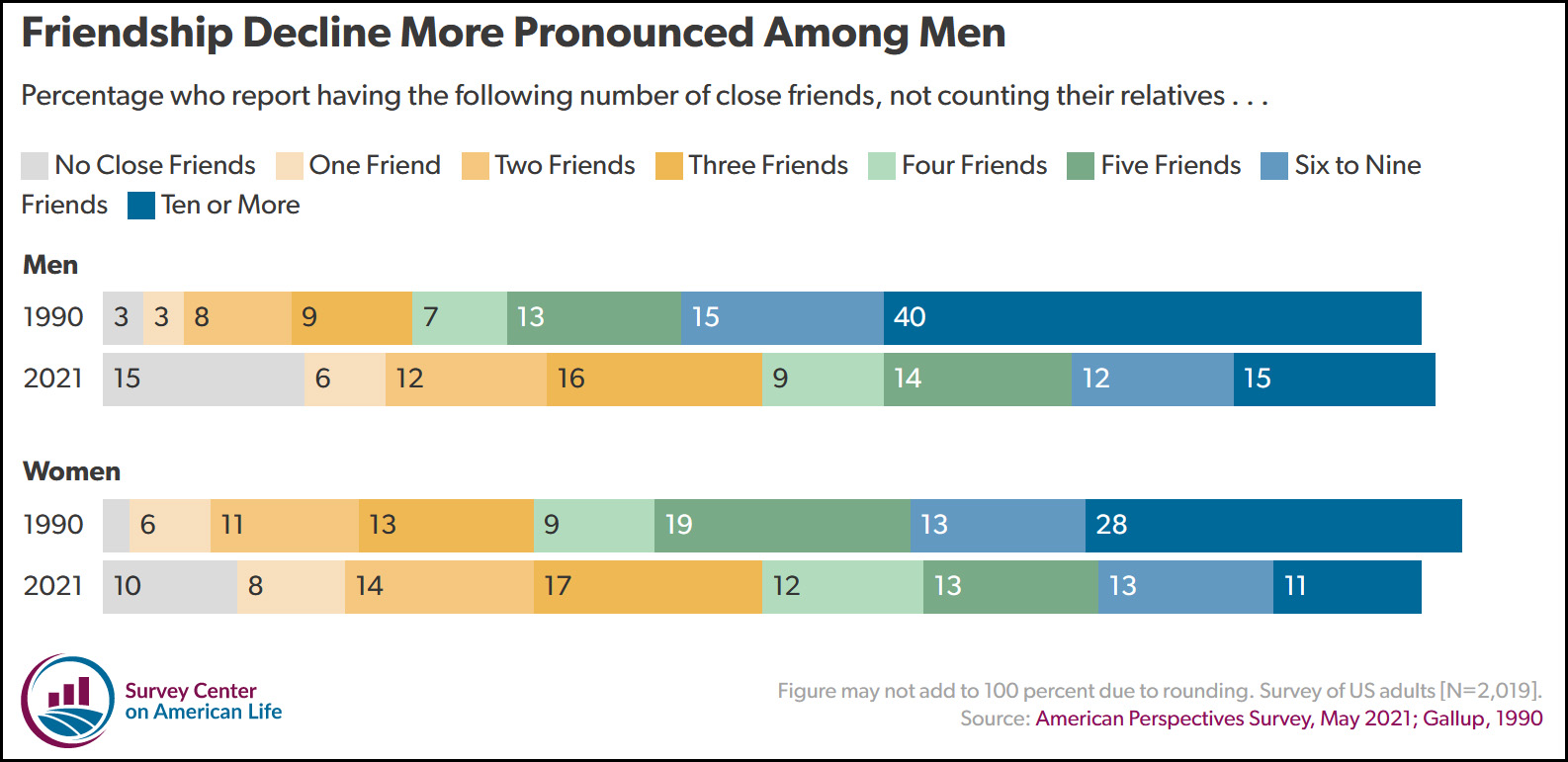 During the pandemic, young women lost touch with more friends than young men. For all age groups, a 2021 survey reported that 33% of men said they had two or fewer friends compared to 32% of women. There's no difference. At the same time, 43% of men reported five or more friends compared to only 37% of women.
During the pandemic, young women lost touch with more friends than young men. For all age groups, a 2021 survey reported that 33% of men said they had two or fewer friends compared to 32% of women. There's no difference. At the same time, 43% of men reported five or more friends compared to only 37% of women.
So: young men are working about as much as ever. They make as much money as ever. They get more college degrees. And they have about as many friends—and keep in touch with them—as women do.
There are, obviously some number of young men who fit the description of loser and listen to Andrew Tate podcasts or read Jordan Peterson books. But overall, the picture of young men in America doesn't suggest much of a crisis. After all, there have always been plenty of awkward young men and awkward young women. It's hard to tease out any sense of increase over the years from the evidence about work, college, and friendship.

I think the problem is that young men need to be taught/encouraged to pursue futures as adults as they actually exist today and not as they might wish they exist in their imaginations. Boys grow up wanting jobs that they are very unrealistic to actually get, like becoming a professional athlete, instead of jobs that actually are growing, like nursing. And our entire educational system is set up to push kids into college instead of useful trades, even though it’s always been the case that lots of boys are better suited to do physical labor with their hands (plumbing, carpentry, etc.).
I first want to agree with Austin and take the concept a bit further.
I have a brother who is a retired Army officer. He points out that men in the military are often nurses, lab techs etc. My brother believes its a lack of motivation, versus the availability of appropriate jobs, that hinder young men in the civilian world.
those "physical labor" jobs also require brains. there's more to being a carpenter than swinging a hammer and more to being a plumber than unclogging toilets. math skills, knowledge of materials and building codes and ability to solve problems — to think outside the proverbial box — are necessary. describing them as merely physical labor is inaccurate and a big part of the problem in getting kids into these trades. also note that these are fine jobs for young women as well as young men.
Real on the web home based work to make more than $14k. Last month I made $15738 from this home job. Very simple and easy to do and procuring from this are just awesome. For more detail visit the given interface.. http://incomebyus.blogspot.com
Women have underwent a more than century long struggle to redefine their identities and in doing so have adopted cultural adaptations to modern life. While more remains to be done our culture does seem to have changed to push women in more productive directions.
While the problems men face are exaggerated, the problems they do face aren't because of anything intrinsic to the state of being male but because our cultural ideas of masculinity have not only not been challenged the way women challenged their roles but men as a group have generally actively opposed any challenging of their traditional roles our cultural scripts regarding masculinity have become increasingly out of step with modern realities. Anecdotally most men I know are doing fine and the statistics show that men as a group are doing fine. However, the men I know who aren't doing fine are almost universally those that bought into traditional scripts about male roles and insist on traditional gender roles in the home and outwardly do things which project masculinity. This subset of men don't seem to be doing that well.
The key difference that I see is that women collectively challenged the culture regarding traditional roles and our cultural ideas around being a woman have tended to reinforce actions that would make women successful. For men, however, our culture around being a man is actively dysfunctional and reinforces self destructive behaviors, these cultural ideas center around adaptations to pre-modern needs and just don't fit modern society as well. Most men have learned to go against type and have adapted as individuals to actually succeed in society. But some significant minority seem to be influenced by cultural ideas around masculinity to adopt behaviors that leave them out of step with modern education, labor markets, and dating. These guys aren't doing well and reaching them will require the culture changing. I know I grew up hearing a lot of BS about being manly and seeing media portrayals that didn't line up with my experiences of how to be successful in life, I assume this is true of almost all men. At the margins these portrayals influence some people to make bad choices and making things better requires challenging these portrayals and focusing on what works today, rather than cultural adaptations for how the world was long ago
"There are, obviously some number of young men who fit the description of loser and listen to Andrew Tate podcasts or read Jordan Peterson books . . ."
I have nothing in particular to add, aside from noting that this line made me chuckle.
This is just a slightly different form of this, that has gone on since the dawn of humanity.
Grog, "Kids today, not want to work hard, just want to draw pictures on cave walls".
Ogna, "And, that terrible dancing they do, not respectable like you and I when we were young".
Repeat, forever!
Much, ado, about nothing, regardless of the slant.
Eve will be along shortly to remind us that young men can actually make big bucks working from that parental basement.
LOL!
Neat charts on all the employment data and such, but I'm not sure they're relevant. The anecdote in the essay(s) that spurred this about young men not working - the concern of losing young men to the manosphere isn't really about whether or not they're working. They know they have to work or have some sort of income to maintain their habits. I'm not surprised that there's nothing there. I'm hesitant to say that the chart of men aged 25-34 who live with their parents says nothing because the percentage of women living at home has also increased by about the same amount, but I suppose it's true that they both increased by about 10%.
The bottom chart, however, is actually very striking. In 1990, 3% of men reported having zero close friends. Now it's 15%?! That bottom chart shows a sharper decline in social ties for men than it does for women, and that pretty directly confirms the social isolation that you've been reading about - but you just chose to ignore it, I guess?
I think you also need to correct for a gender-norm-based difference in the self-reporting here: there's no reason to think that men and women would have a significantly different number of friends, is there? Were men over-reporting their number of friends, for some reason? Or were women under-reporting? What if they still are? But even if there was something going on here with social norms/expectations, you'd look at the change between them, and the change is much more pronounced among men than among women. You can't just handwave that away.
Close friend is such a subjective term, and it would not surprise me if the defintion varied between men and women. There are several couples in our neighborhood that my wife and I hang out with. We pretty much exclusive hang as couples -- pub quiz night, pizza and BBQ at each others' houses. My wife considers the wives to be close friends. I would never describe my relationship with the husbands that way. They barely register as acquaintances -- even though I spend as much time with them as she does with the wives. For what that's worth...
It is all written just to get clicks and feed the doom scrollers…. Some people actually believe this stuff
It's been pretty lucrative for a certain flavor of con men and scammers, too.
"Live alone or with parents" is an odd conflation. A person who lives alone is, pretty much by definition, economically established; they can afford a place of their own. A person aged 25-34 who lives with their parents is probably struggling economically. The only thing the two groups have in common is that they're not paired up.
👍👍👍👍👍
Nice piece, Kevin. I've been a long time reader because of your graphs. Be well.
This is a hard issue to discuss because whenever you bring it up people insist on making it political.
Issues that Kevin has omitted include
- MOST IMPORTANT: aggregate statistics (like college enrollment/graduation) are not the point. The claim is not that the male mean is moving downward, let along what's happening at the higher end. The claim is that for the lowest 10% or so of men, things are going very badly.
- insisting that things haven't changed in the past 10 years. The claim is not that this is unique to the past ten years, it is that the trend lines are all getting worse, not flattening out
- unemployment numbers have to be handled carefully because the issue is not unemployment per se, it is either resignation from the labor force (no longer looking) or severe underemployment
- social attitudes matter. The woman living in her parents' basement is a figure of sympathy, a striver who is saving her money while taking care of her parents. The man living in his parents' basement is a Jabba the Hutt figure of mockery.
Likewise the one group you're still allowed to mock endlessly and with zero empathy is the incel (who is, of course, always male).
Here's an article that looks at (one particular version of, far from the most important, but at least with some known numbers) the issue from the inside:
https://nymag.com/intelligencer/2019/02/the-world-of-american-hikikomori.html
As you read it, remember the point I made: these are NOT claims about the average male, they are claims about a growing population of outsider males.
If you want to dismiss the claims, or at least show that they're no playing out this way, AT THE LEAST START WITH RELEVANT STATISTICS! Otherwise it's unclear whether you're an idiot or a motivated liar, but either way your opinion is worthless if you couldn't even be bothered to understand the actual issue.
A classic fisking (anyone remember that term?) by Kevin. Or should I say, a classic drumming.
Maybe it's not that important but Christine Emba's article was in the Washington Post.
Thanks for pointing this out! That's where I read it, too. Lots and lots of comments, many of them hating on the author because she's a girl. (The "loser men" seem to have an outsized 'net presence.)
Men have been earning "as much as ever", that is their real earnings have been flat, since 1980 - that's bad.
https://fred.stlouisfed.org/graph/?g=17lZM
Women's real earnings have increased somewhat - that's not as bad. It's good that the gap has narrowed, but both men and women wage earners have been losing with respect to high-income people, especially the 1%. Their chances of getting their own house, etc. have decreased.
There are definitely things that low-income young men and women have to complain about economically. But I agree with Kevin that the idea of a "crisis" among men especially is overdrawn and may be invalid. This seems to be at least partially an issue the the right raises to distract from the still-increasing inequality. Too bad the "liberal" media go along.
In summary, men were too manly. Now they aren't manly enough.
Something tells me all of these books were written by women. 😛
It is like Kevin does not or has never read the "Incel Press," and so he has no idea what their real complaint really is...Sex, Sex, Sex...what is it, how to navigate it, how to achieve some level of intimacy with another living person?
And that person being female.
Which has never been less than fraught with difficulties and misunderstandings...but now the equation really seems different to me....Love and sexual success, whatever that means, are more difficult...Chads do maybe rule supreme, but it has always been thus...but the great middle sees itself and excluded and mystified...
As well they should by mystified...Female sexuality? What can any man say except...yikes, what is this thing of beauty and mystery and terror?
There are valid complaints of what is expected of women sexually in today's world....well triple that for men...performance anxiety x infinity. The Joy of Sex? Fear of Flying? Who would write such books now? Where is some rational conversation that sex is fun, but important...pathways for everyone to become better human beings?
Well, enough of my educational writing...lol...let me close with, me at least, being happy that Kevin Spacey was acquitted today, and, as an aside, what to make of the fact that Ms. Jennifer Siebel Newsom testified long at the trial of Harvey Weinstein and yet the jury failed to convict Mr Weinstein of the rape of Ms Newsom...what are the political ramifications of this? Are there political waves from this that harm Mr Newsom?
Sex? Strange stuff...strong magic, potentially destructive, potentially a balm to the real rigors of living. Yep...Best Wishes, Traveller
It's younger men (20-24 and 35-44) that are dropping out of the labor force in the past 10 years. Women aren't dropping out. See "Participation rate change, 2011–21" from the Bureau of Labor Statistics (https://www.bls.gov/emp/tables/civilian-labor-force-participation-rate.htm).
The vast majority of the drop in college enrollment in the past 10 year is men. See "figure 3" in https://nces.ed.gov/programs/coe/indicator/cpb/college-enrollment-rate and "figure 1" in https://www.brookings.edu/articles/the-male-college-crisis-is-not-just-in-enrollment-but-completion/
Even if the % are small, they are adding up over time. I think the younger generation of men are in fact doing worse on many indicators and their rate of decline is much faster than women's (and on many indicators women don't have a rate of decline at all).
Jump to a conclusion, look for evidence to confirm and defend your conclusion, and you will find it. Full stop.
Examine the evidence and draw an evidence-based conclusion, and you'll likely end up drawing a conclusion you didn't want to draw.
Signed,
Broken Record